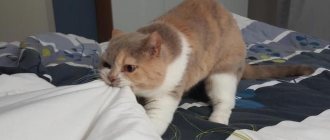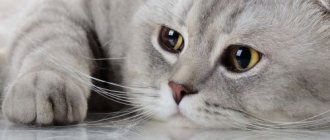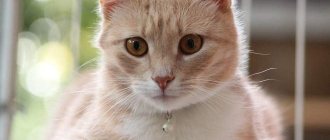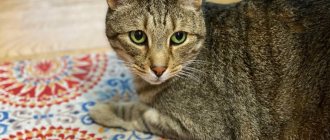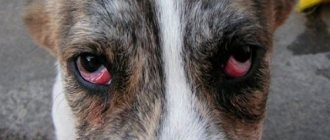Why do my ears smell bad?
Unpleasant odor from a cat's ears can be caused by the following factors:
- Suppuration that occurs against the background of traumatic injuries. Often, pets independently scratch the inside of the auditory organs when they are scratched, and fights are not excluded. When the infection gets into the ear, there is brown discharge with pus, a bad odor and a deterioration in the general condition of the cat, possibly an increase in body temperature.
- An inflammatory process caused by various liquids entering the hearing organ. Mostly, water ends up in them due to the carelessness of cat owners while bathing.
- Skull trauma. Impacts can cause bleeding and inflammation in the ears. As the blood accumulates, it becomes infected and the ear becomes inflamed. In addition to the smell of rotten meat, you can notice pus.
- Otitis. It is an inflammatory process in the ear, as a result of which animals experience discharge from the auditory organs, loss of appetite, and an unpleasant odor. It is important for the owner not to ignore these symptoms, since the pathology can cause a serious deterioration in hearing function or lead to complete deafness in the affected ear.
- Ear mite. The disease is often caused by the superficial sarcoptoid mite Otodectes cynotis. During the course of the disease, an inflammatory process occurs, which is sometimes complicated by infection, as a result of which stink is observed from the ear.
- Allergy. Mostly allergic reactions to foods are detected in cats, but medications, care products, and pollen can also act as allergens.
- Neoplasms. If your kitten's ear stinks, this symptom may be the first sign of a malignant or benign tumor developing in the auditory organs.
Prevention
Prevention of the disease consists of monthly examination of the ear canals and preventive removal of accumulated wax. According to the anatomical features of the structure of shells in Sphinxes, Siamese, and Orientals, they are treated weekly.
One of the reasons for the development of otitis media is an allergic response to food. Housewives who treat their pets with food that is unusual for cats, as well as those who abuse vitamin supplements, are to blame. An excess of biological catalysts is more harmful than hypovitaminosis. The optimal solution is to use premium professional feed.
Timely disinsection prevents the proliferation of ectoparasites, as well as ear mites. The latter are activated when the immune system is weakened, so timely vaccination will protect the cat from viral infections and arthropod parasites.
Bathing causes a lot of anxiety. The animal does not need water treatments, but cat owners think differently. To prevent liquid from getting into the ear canals, you need to insert cotton plugs before bathing, and do not forget to remove them after the procedure.
Regular ear cleaning prevents ear infections
Associated symptoms
The animal may often rub the outer part of the auditory organ with its paw.
In addition to the fact that the cat’s ears begin to stink, the owner of a pet may notice the following undesirable symptoms:
- rubbing the auditory organs with a paw;
- redness of the inside of the ear;
- loss of appetite;
- general increase in body temperature;
- apathy or irritability;
- constant meowing;
- rashes on the skin.
Medicines for otitis media
Treatment of otitis is carried out using systemic and local drugs. The prescription list includes medications recognized in veterinary medicine. Basic therapy can be supplemented with traditional medicine. To achieve a positive result, it is important to follow the treatment regimen and duration of the course prescribed by the veterinarian.
Medicines of official medicine
To sanitize the auricle and external auditory canal, use sterile gauze wipes soaked in an antiseptic solution. Boric acid (3%), chlorhexidine, hydrogen peroxide (3%), furatsilin, miramistin are suitable for this purpose. If the eardrum is not damaged, then drops for otitis media can be used for treatment:
- Sofradex;
- Dexamethasone;
- Aurikan;
- Uricin;
- Surolan;
- Anandin;
- Otibiovet;
- Tsiprovet;
- Tsipam;
- Otovedin.
Otibiovet
The medicine comes in the form of clear drops. The dropper bottle can have different volumes - 20, 30 or 50 ml. The drug is used for otitis of the external and middle ear. Active substances (gentamicin sulfate, triamcinolone acetonide, salicylic acid, carbetopendicinium bromide) act against bacteria and fungi. Drops reduce itching, discharge, and reduce the manifestations of dermatitis.
Surolan
An oily suspension containing miconazole nitrate, polymyxin B sulfate, prednisolone acetate. This is a combined drug that has anti-inflammatory, antibacterial, fungicidal, and antiallergic effects. The volume of the bottles is 15 or 30 ml.
If otitis in cats is caused by bacteria or they are a secondary cause of inflammation, systemic antibacterial drugs are prescribed. The use of these medications is also justified for fungal otitis in order to prevent infection by bacterial microflora. The list includes:
- Amoxiclav;
- Ampicillin;
- Amoxicillin;
- Cefazolin;
- Ceftriaxone;
- Cefixime;
- Erythromycin;
- Clarithromycin;
- Azithromycin;
- Spiramycin.
Ampicillin
global $ads_google; //data-ad-slot=”2475549904″ $ads_google = empty($ads_google) ? false : true; ?> if ($ads_google == false) {?>
$ads_google = true; ?> } ?>
Semi-synthetic drug of the penicillin series. Available in the form of tablets and powder for suspension. The medicine has a broad antimicrobial effect. The tablets are given to the cat on an empty stomach or 2 hours after eating.
Cefixime
Semi-synthetic antibiotic from the group of cephalosporins in tablets or powder. Active against many pathogenic bacteria. Used to treat otitis media in the acute stage. Not suitable for small kittens and sick elderly pets.
To treat integuments affected by parasitic fungi, fungicidal ointments are used: Panolog, Oridermil, Clotirmazol, Nystatin. In some cases, MycoStop ProVET antifungal drops are indicated. Complex therapy includes vitamin-mineral complexes and immunomodulators (Imunofan, Ribotan). They help the cat's body resist infection.
Folk remedies
Additional support for otitis media in cats is also provided by traditional medicine recipes. They are easy to prepare and use at home. The most harmless solution is considered to be a solution made from strong green tea. The filtered tea leaves are used to wipe the cat's ears. This product has a disinfectant and acaricidal effect. An infusion of herbs with antibacterial and anti-inflammatory effects has a similar effect. Chamomile, string, lavender, birch leaves, and St. John's wort are suitable for processing.
Diagnostics
If a cat has a bad ear odor, it is important for owners to take the animal to a veterinary clinic as soon as possible. At the appointment, the veterinarian will conduct a survey of the owner, during which he will find out how long ago the bad smell appeared and whether additional symptoms are present. The doctor then begins to examine the ears using an otoscope. Next, the sick animal is prescribed a general blood test, as well as an ear smear. If necessary, a biopsy is prescribed, during which a piece of tissue from the auditory organ is removed.
How is the treatment carried out?
General recommendations
Part of the treatment of the disease is cleansing the auditory organs with peroxide.
The treatment regimen is directly related to the factor that provoked the stench from the cat’s ear. When the inflammatory process is accompanied not only by a bad odor, but also by suppuration, pet owners will need to cleanse the ear organ of pus daily. To carry out the procedure, you will need to follow the following algorithm of actions:
- Get rid of fur from the inside of the ear.
- Using a cotton swab and disinfectant solutions, clean the ear from discharge. It is recommended to use hydrogen peroxide.
- Dry the ear. It is permissible to use gauze, a bandage or a napkin, carefully blotting the organ.
After these manipulations, you need to resort to the help of medications prescribed by the veterinarian. For example, if a cat is diagnosed with otitis media, medications are prescribed that have a bactericidal, anti-inflammatory, anesthetic, antimycotic effect. Ear drops "Aurikan" and "Surolan" are often used. You will need to instill medications into both ears, even in a situation where only one is affected.
The right approach to nutrition
It is important that the animal eats vegetables during illness.
During therapy, the pet owner will need to monitor its diet. It is important to include food in the menu that is well digestible and contains a sufficient number of microelements and vitamins. It is recommended to feed cats lean meats, vegetables, rice and buckwheat, chicken and quail eggs. Once a week it is permissible to pamper your cat with boiled fish and fermented milk products. As for industrial feeds that are sold in stores, veterinarians from the Zoovet clinic recommend abandoning them during therapy. Such precautions are due to the fact that allergens may be present in their composition.
It is permissible to return to ready-made food only after the source of allergic reactions in the cat has been accurately identified.
Hematoma
One form of blood blister may occur in your cat's ear. It appears between the layers of the ear when the animal begins to scratch the ear. Blood from damaged vessels forms clots, which are usually removed either through surgery or through gentle treatment with special ointments. The course of their application to the affected area is several weeks.
Often a hematoma is formed due to mechanical damage. If you practice free-range with your pet, you should always be on guard. An animal can seriously damage not only the ear, but also other organs, for example, in a fight with relatives or dogs, when falling from a great height, or after being hit by a vehicle.
However, sometimes a hematoma is formed due to a pre-existing disease, such as otitis media, fungal infection of the ear, the already mentioned otodectosis and others. Infectious and parasitic diseases cause cats to scratch non-stop, resulting in self-injury.
Preventive actions
To prevent an unpleasant aroma from a cat’s ears, it is important for the pet owner to systematically examine his hearing organs. At least once a week you will need to clean your ears using special liquids and cotton swabs. The cat's owner also needs to ensure that she does not spend time in drafts. When bathing, it is recommended to insert cotton balls into your pet's ear to prevent water from getting into them.
After the bath, the animal should be in a warm room. If necessary, the cat can be carefully dried with a hairdryer. An important preventive measure is diet control. If the owner prefers to give the cat ready-made industrial food, it is imperative to take into account its composition and expiration date. When choosing complementary foods, you need to pay attention to the gender, age and health status of your pet.
Causes of unpleasant odor from a cat's ear
To correctly diagnose the cause of the disease, the doctor will need to tell you what other symptoms of the disease are observed in the cat, besides the smell from the ear. To do this, you need to carefully monitor the behavior of the animal.
© shutterstock
Here are some of the symptoms that indicate ear problems:
- refusal to eat;
- The cat often shakes its head, as if trying to get rid of a foreign object in its ears. In addition, he may often scratch his stinking ear with his paw, and when walking, keep his head slightly tilted;
- the skin on the inside of the cat's ear turns red and may swell;
- If no problems are visible, but the cat is nervous, you should lightly press on the ear. If at the same time liquid is released from it, there is an unpleasant odor and a “smacking” sound is heard, then the cat has problems with the ears;
- if the case is advanced, the cat's temperature may rise.
Possible reasons
Any disease that causes odor from the ears of cats is very dangerous, as it can lead to complete deafness of the animal, and in some cases even to death. When a cat’s ear stinks, it means that there is an inflammatory process going on, but only a doctor can tell in which part of the ear.
Here are some reasons why a cat's ear stinks:
- any injury to the ear, for example, a bruise, a bite, can cause a hematoma;
- fluid that gets into a cat's ear can cause inflammation;
- allergies, possibly to vitamins, food and other additives;
- a tick, some other insects that make you scratch your ears.
© shutterstock
The inflammatory process in a cat, during which the ear stinks, is called otitis media. It can form on any part of the ear, which will determine the severity of the disease. Otitis of the inner ear is considered the most severe and difficult to treat. In this case, the ears may become swollen, the shell will become red, hot, and a strong unpleasant odor will emanate from inside.
Treatment, in the clinic and at home
Some diseases can only be treated at home, without the intervention of a specialist, but otitis media is not the case when you should self-medicate. Therefore, the first step in treating a pet is to examine the doctor.
After an examination, the doctor will determine which part of the ear is affected by the inflammation. When a cat's ears smell, it means that the middle or inner ear is inflamed. Unfortunately, it is impossible to see the source of inflammation with the naked eye, so it is imperative to consult a specialist. In a clinical setting, blood tests and scrapings will be required.
After receiving the tests, the veterinarian will prescribe a course of antibiotics. In addition, it is necessary to carry out procedures during the day to cleanse the ear of pus. To do this you need:
- remove hair from the inside of the ear;
- Clean your cat's stinking ear from accumulated secretions. This can be done using disinfectant solutions, such as hydrogen peroxide;
- Next you need to dry the ear. To do this, use gauze, napkins or a piece of bandage, which is used to soak the surface of the ear;
- After the procedure, the cat’s ears should be instilled with the medicine prescribed by the doctor; the dosage should be strictly observed;
- Monitor your pet's well-being. If your cat's ear is leaking and stinks, you should immediately consult a doctor, as the cat may become worse, and this can be fatal.
During the course of treatment, it is necessary to carefully monitor the cat’s nutrition. Food should be easily digestible and contain the required amount of vitamins and minerals. Try to avoid eating prepared foods, as they can be a source of an allergic reaction.
© shutterstock
If you strictly follow the doctor’s instructions, your cat will quickly recover. But any violation of the regime can lead to serious complications.



